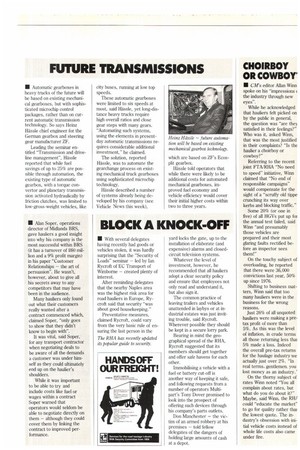FUTURE TRANSMISSIONS
Page 31

If you've noticed an error in this article please click here to report it so we can fix it.
• Automatic gearboxes in heavy trucks of the future will be based on existing mechanical gearboxes, but with sophisticated microchip control packages, rather than on current automatic transmission technology. So says Heinz Hassle chief engineer for the German gearbox and steering gear manufacturer ZF.
Leading the seminar entitled "Transmission and driveline management", Hassle reported that while fuel savings of up to 25% are possible through automation, the existing type of automatic gearbox, with a torque convertor and planetary transmission activated hydraulically by friction clutches, was limited to low-gross-weight vehicles, like city buses, running at low top speeds.
These automatic gearboxes were limited to six speeds at most, said Hassle, yet long-distance heavy trucks require high overall ratios and close gear steps with many gears. "Automating such systems, using the elements in presentday automatic transmissions requires considerable additional investment," he claimed.
The solution, reported Hassle, was to automate the gearchange process on existing mechanical truck gearboxes using sophisticated microchip technology.
Hassle described a number of systems already being developed by his company (see Vehicle News this week), which are based on ZF's Ecosplit gearbox.
Hassle told operators that while there were likely to be additional costs for automated mechanical gearboxes, improved fuel economy and vehicle efficiency would cover their initial higher costs within two to three years.






























































































